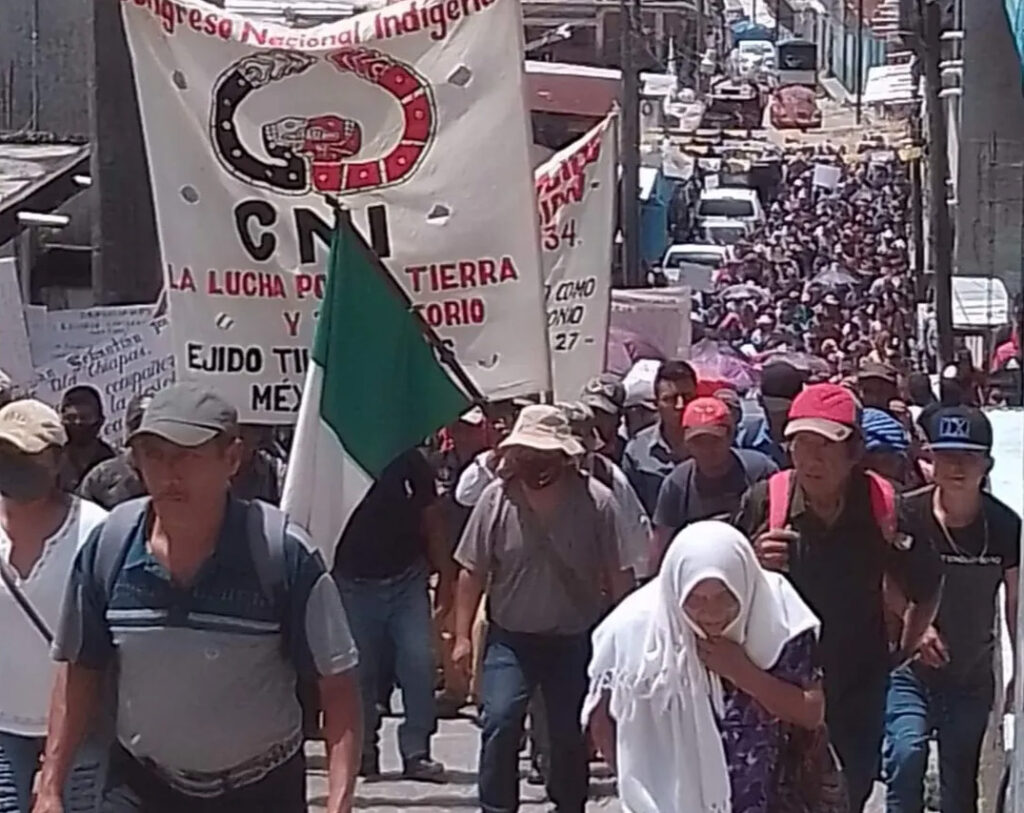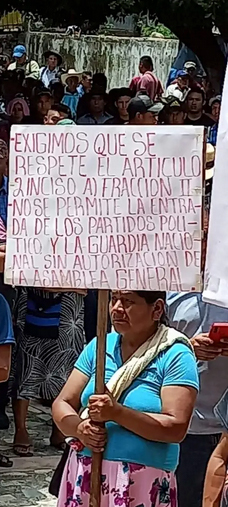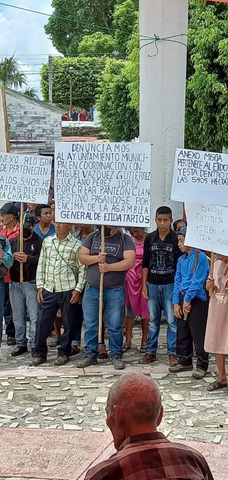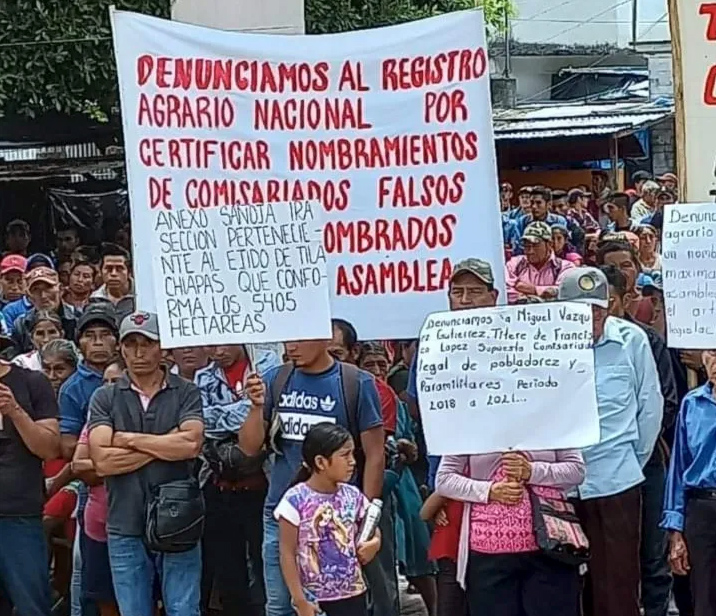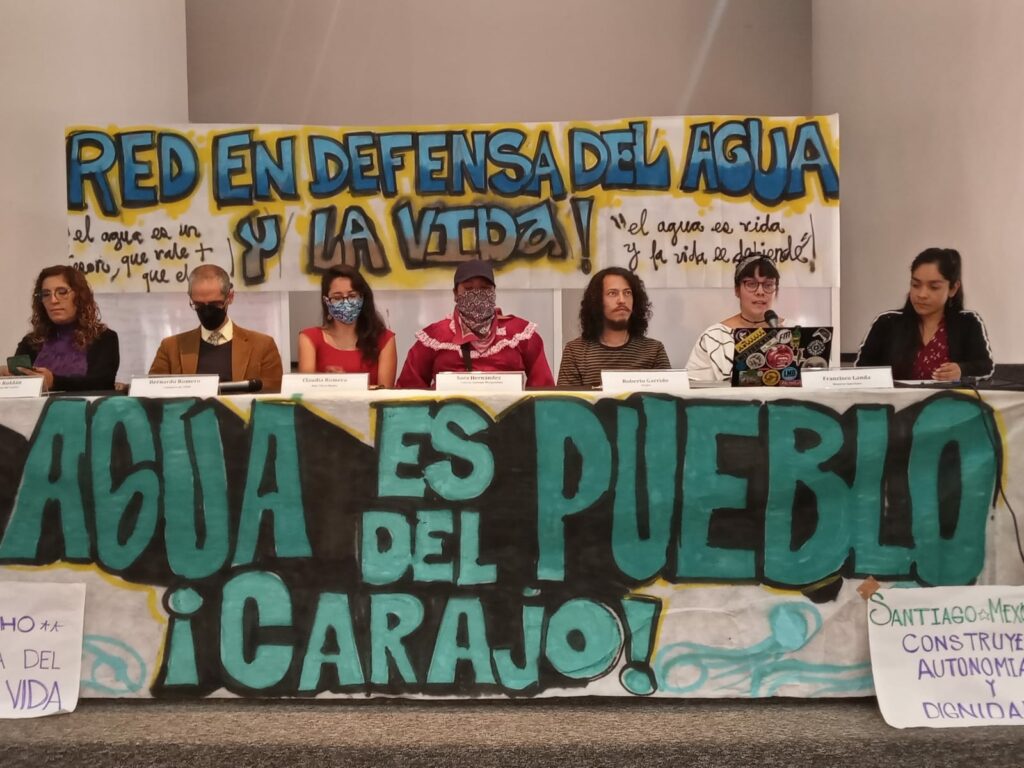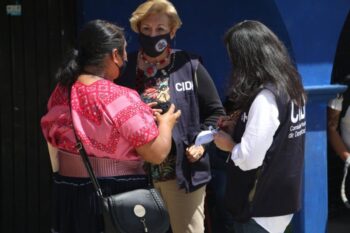
Mexico
(Español) Oaxaca está en crisis: No hay donde descargar toneladas de basura
Fuente: Avispa Midia
Por Santiago Navarro F
En portada: Recicladores del relleno sanitario de San Lorenzo Cacaotepec trabajan separando los desechos de materiales que aún se pueden aprovechar. Foto: Santiago Navarro F.
Un adolecente camina tranquilo mientras patea un bote vacío que, por su aspecto y color, pertenece a una marca reconocida de refrescos en México. Este bote de plástico se desbordó de uno de los contenedores de basura instalados en las principales calles de Oaxaca, ciudad al sur de este país que se ha convertido en un referente de los principales atractivos turísticos y que a diario generan decenas de toneladas de desechos que nadie se pregunta a dónde van a parar.
Según la Secretaría de Servicios Municipales de Oaxaca de Juárez, tan solo en el mes de julio, fecha en que se realizó la Guelaguetza 2022, una de las fiestas más emblemáticas de esta entidad que atrajo a miles de turistas, dejó como saldo más de 800 toneladas de basura. El titular de esta instancia, Ferdinando Rosado Duarte, ha alertado que derivado de esta situación la capacidad para el transporte de los desechos fue rebasada en un 25%.
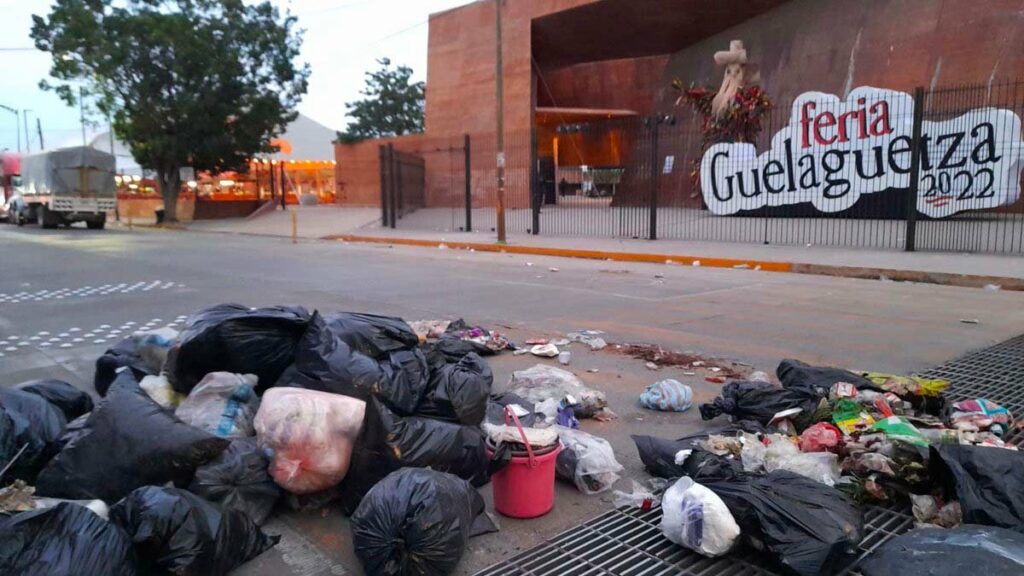
Esta basura tiene como destino el llamado “relleno sanitario” ubicado en el municipio de la Villa de Zaachila, establecido a menos de 40 minutos de la capital de Oaxaca, el cual ha llegado al límite de su capacidad desde hace más de una década. “Conocemos detalladamente que el relleno, desde la administración de Ulises Ruiz Ortiz en 2006 (exgobernador de Oaxaca) el basurero había llegado a su vida límite”, puntualizó Artemio Martínez, quien fue representante de la colonia El Manantial, ubicada en la zona baja de donde se concentra la basura.
Cuando el señor Martínez se refiere a la vida útil de este tiradero, está hablando principalmente de la geomembrana o celda de confinamiento que retiene los lixiviados de los desechos urbanos. “No solo sabemos que ha llegado a su límite, sino que lo vivimos. Nosotros, al no tener agua potable, hacemos pozos para obtener agua y así atendemos nuestras necesidades. Pero los lixiviados han llegado hasta el agua que extraemos de estas fuentes”, agrega el vecino del basurero quién hizo las denuncias ante las autoridades correspondientes.
Incluso, la organización sin fines de lucro llamada Solidaridad Internacional Kanda (Sikanda), quién intentó impulsar un sistema de reciclaje inclusivo en esta zona, evalúa que el nombre del llamado “relleno sanitario es solo en teoría”, que en realidad “es un basurero a cielo abierto. Simplemente porque no cuenta con la infraestructura ni el personal adecuado para tratar estos desechos”.
Martínez agrega que los lixiviados, “en temporadas de lluvia pasan como un río en nuestras colonias. A esto se suman las enfermedades y las represalias hacia quienes hemos denunciado la contaminación y actos de corrupción. Nadie quiere hacerse responsable de su basura”.
Un trato especial
Son aproximadamente 26 los municipios conurbados que depositan sus desechos en el tiradero de Zaachila. Tres de ellos son los que apuntalan la cantidad diaria que se genera de residuos urbanos: Los municipios de la ciudad de Oaxaca, Santa Lucia del Camino y Santa Cruz Xoxocotlán.
Edgar Sereno Cruz, integrante de Sikanda, asevera que “lo ideal es que cada municipio debiera hacerse cargo de su basura. La ley lo dice, en relación a los solidos urbanos son los municipios; los residuos de manejo especial es una responsabilidad compartida entre municipios y el Estado; los residuos peligrosos son responsabilidad de la federación”.
Sereno Cruz es coordinador del proyecto de Reciclaje Inclusivo en Oaxaca y alerta que en los tres tipos de residuos no existe infraestructura ni lugares adecuados para el trato de la basura que generan estos municipios y, por tanto, terminan en basureros a cielo abierto, como el de Zaachila.
A esto se suma una red privada de recolectores que, a través de camionetas, recorren diversas colonias para colectar la basura mediante un pago y que al final termina en el mismo tiradero de Zaachila.
Este miércoles (3), los recolectores se manifestaron en la ciudad de Oaxaca obstaculizando el flujo vial en diversas avenidas y arrojando basura en la plaza de la Danza y el palacio municipal a manera de protesta. Sus exigencias son que se les permita depositar la basura que recolectan en este tiradero.
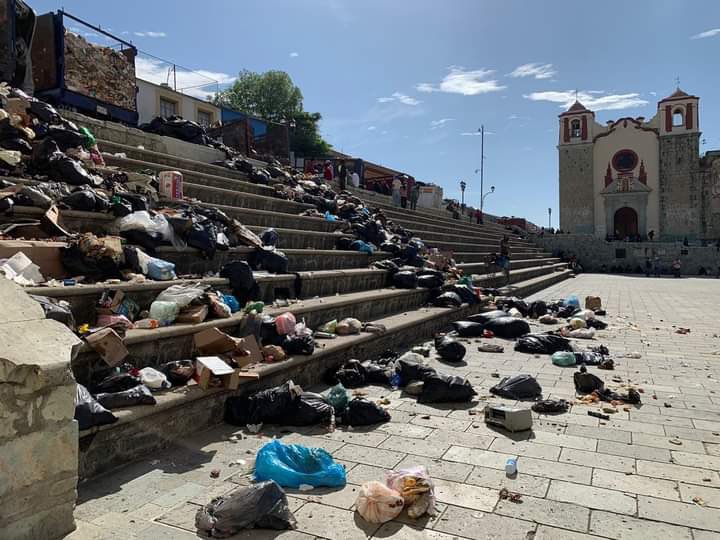
De acuerdo con el alcalde Francisco Martínez Nery, la prohibición del acceso de vehículos particulares al basurero “no es una decisión de la autoridad municipal de Oaxaca de Juárez”, sino que es una determinación de los pobladores de la Villa de Zaachila, quienes se supone cerraron el basurero por las afectaciones ambientales y a la salud.
El señor Artemio Martínez lamenta que a pesar de que ha habido reuniones entre el municipio de la ciudad de Oaxaca de Juárez, de quien depende el basurero de Zaachila, y los municipios que depositan su basura en este lugar, no se ha encontrado una solución radical, “por el contrario, se esta creando una mafia que está cobrado a quienes llegan a tirar su basura. Quienes pagan tienen acceso. Esto sin considerar que este lugar ya no es idóneo para soportar más basura”.
Martínez arremete y sostiene que “hay un trato especial para algunas personas o municipios. Durante las fiestas de la Guelaguetza se acordó que no se recibiría basura de los 26 municipio que comúnmente vienen a dejar sus desechos. Pero si recibiría la basura del municipio de Oaxaca y fueron cientos de toneladas que se generaron en las fiestas”.
En el caso de basurero de Zaachila la celda de confinamiento ha sobrepasado su límite. “Lo único que hacen es que una maquinaria va arrinconando la basura en forma de montañas generando contaminación aérea y lixiviados sin control”, agrega el integrante de Sikanda.
El modelo que prevalece
Es sencillo, casi todos en Oaxaca sabe como funciona el modelo. Pasa un camión y cada quien tira la basura revuelta, la cual al final termina en las montañas a cielo abierto. “Rellenos sanitarios como tal, son aproximadamente 23. Pero no todos cumplen con su funcionamiento, son solo algunos”, detalla Sereno.
El capacitador de la Organización Sikanda lamenta que de los 570 municipios que comprenden al estado de Oaxaca, los rellenos sanitarios existentes no cubren ni el 1% del trato de la basura de esta entidad. “Medianamente hay una experiencia en Huajuapan; San Lorenzo Cacaotepec; San Sebastian Tutla; El Tule; Mitla, el resto son basureros a cielo abierto. Existe como tal una crisis de la basura porque sistemáticamente no tienen un plan de manejo ni personal capacitado”, sostiene Sereno.
Mientras tanto, el alcalde del ayuntamiento de la ciudad de Oaxaca ha anunciado que ya hay planes para la adecuación de un nuevo espacio de 10 hectáreas, donde se establecerá una compactadora de residuos sólidos, a través del cual utilizarán materiales para los hornos de las cementeras Cruz Azul y Cemex. Por ahora, se esta buscando desesperadamente donde colocar cientos de toneladas de basura generadas diariamente. Algunas de las propuestas son la Central de Abastos y un viejo cuartel de policía que se mantiene en obra negra.
Pepenadores en el olvido
El mal manejo de la basura en Oaxaca se recarga sistemáticamente en los tres niveles de gobierno y de la propia ciudadanía que genera la basura. La lógica es que todo es desechable y la responsabilidad de tratarlo es de un tercero, lo cual no existe. Aunque en los tiraderos a cielo abierto hay gente que intenta clasificar y recuperar lo que sirve para reciclar y son llamados despectivamente como pepenadores.
Sereno advierte que hay gente que piensa que los tiraderos existen porque hay pepenadores, “la realidad es que estás personas trabajan en condiciones infrahumanas, sin ningún derecho ni seguridad laboral, están en el olvido. Lo que debe quedar claro es que ellos no son los responsables de la generación de basura, pero sí ayudan al intentar rescatar algo mínimo de estos desechos, como el aluminio, vidrio, cartón, entre otros”.
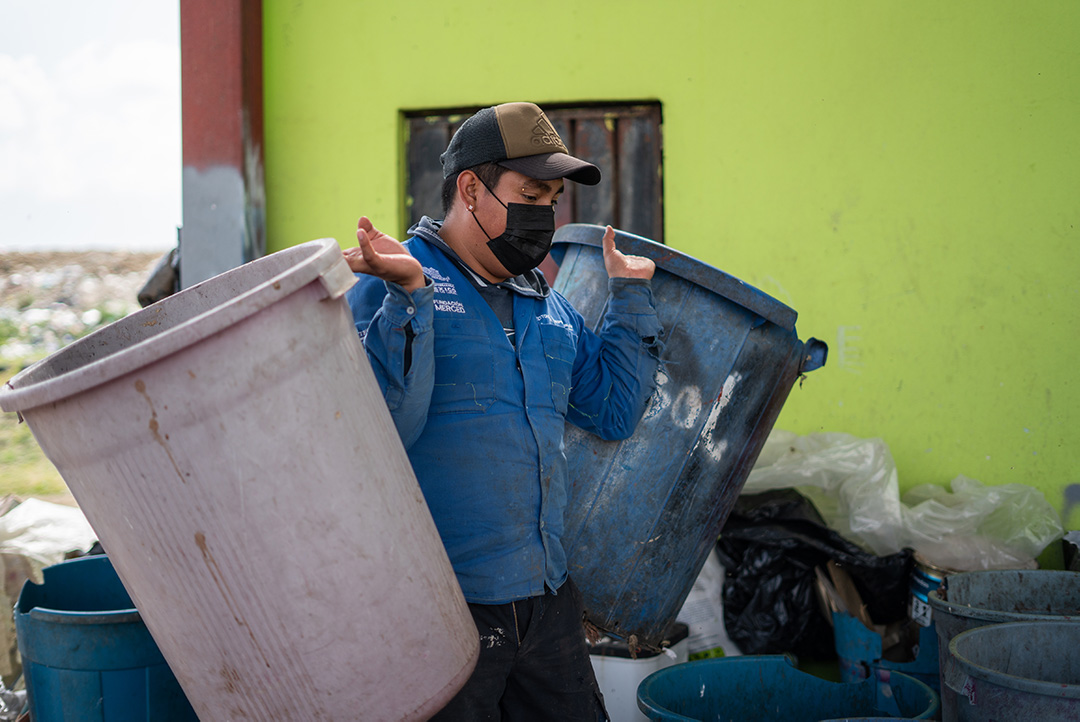
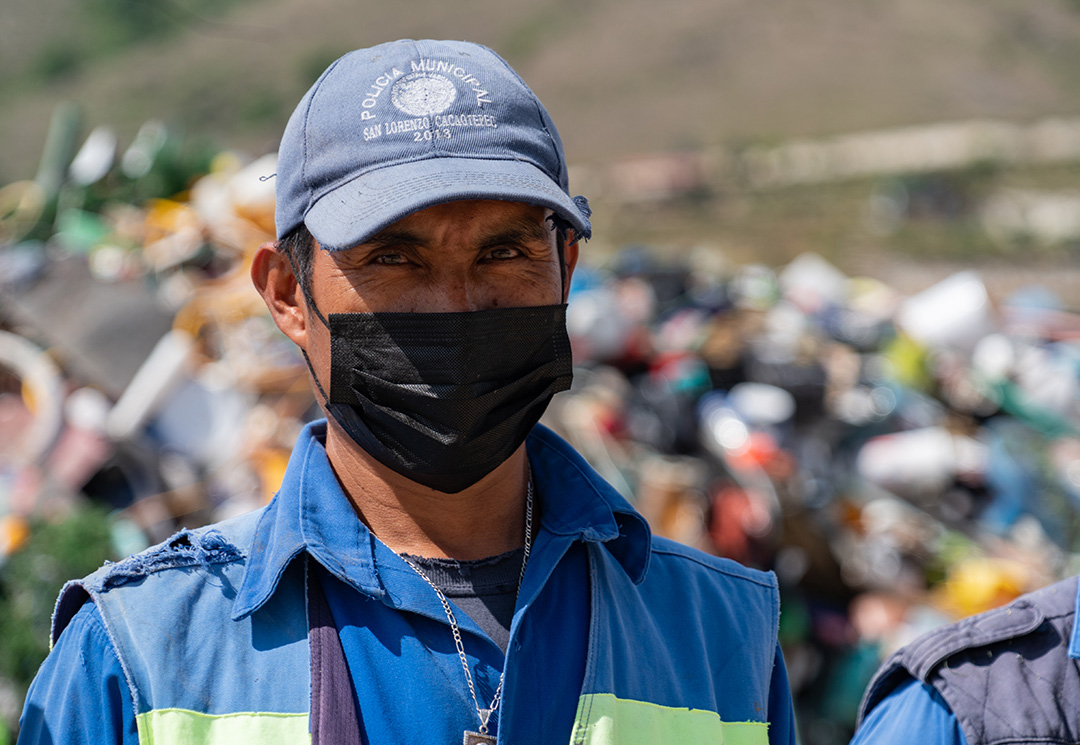
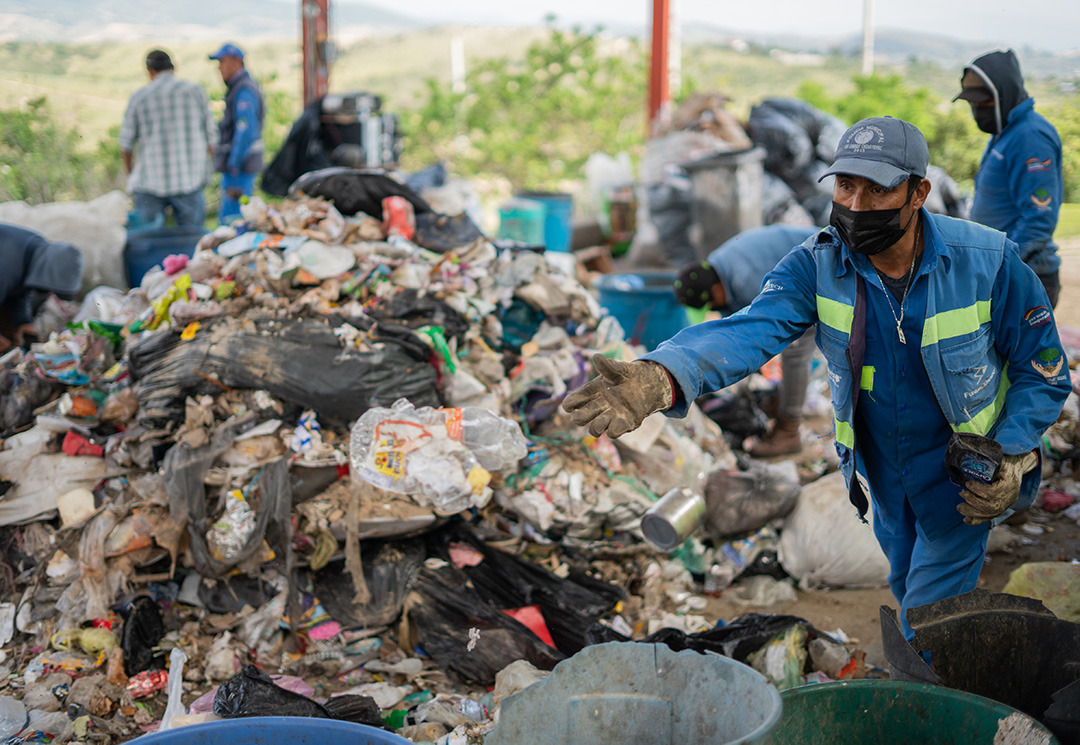
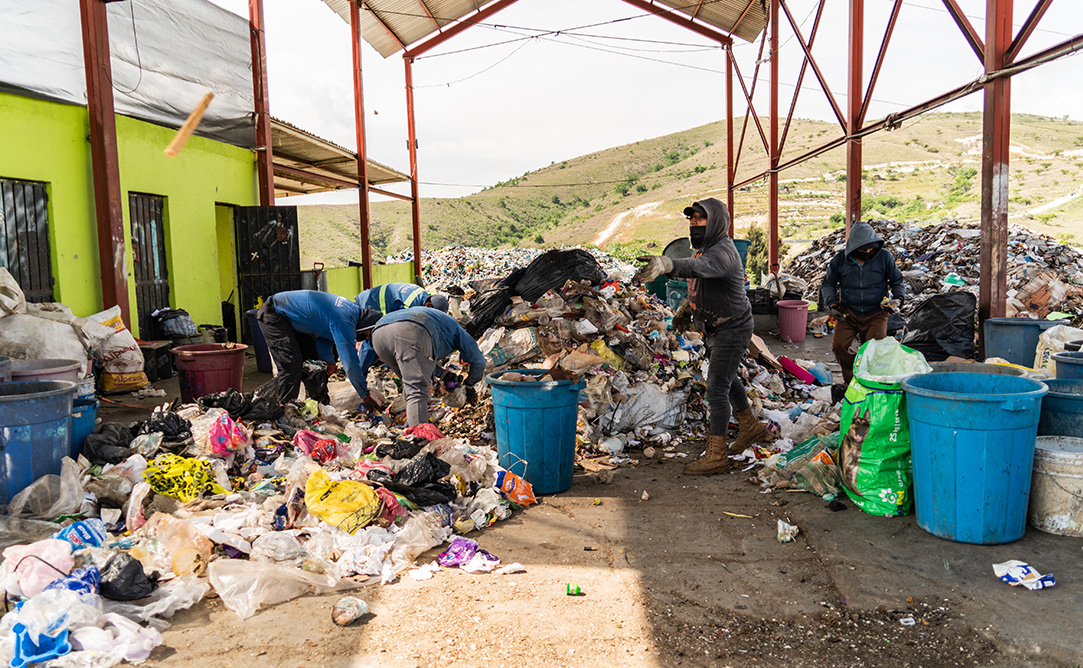
Recicladores del relleno sanitario de San Lorenzo Cacaotepec trabajan separando los desechos de materiales que aún se pueden aprovechar. Fotos: Santiago Navarro F.
Las malas condiciones de vida no solo se recargan hacia los llamados pepenadores, “sino a las colonias vecinas, quienes sufren de enfermedades como de tipo gastrointestinales, en la piel, en los ojos. En estos lugares es muy fácil la propagación de enfermedades”, agrega el capacitador de Sikanda.
Una experiencia inspiradora
En un contexto de crisis de la basura que vive Oaxaca pareciera que no hay opción a corto plazo, aunque a menos de 30 minutos de la capital existe una experiencia distinta. De entrada, no es un tiradero, pues los trabajadores aquí hacen énfasis en que es “un relleno sanitario” y que ellos no son pepenadores, sino “recicladores”.
Estas personas, incluyendo mujeres y no binarias, quienes integran la plantilla de recicladorxs, cuentan con equipo como guantes, botas, overoles y reciben capacitación continua. Además, tienen un sueldo seguro, vacaciones y atención de salud. Se les ve felices.
Esta experiencia ocurre en el municipio de San Lorenzo Cacaotepec. “Esto solo es posible gracias a los usos y costumbres de esta comunidad. Esta responsabilidad lo atrajo la asamblea comunitaria y no solo recayó en las autoridades. Aquí hay una visión comunitaria”, comparte Sikanda.
En este relleno se aprovecha y se clasifica todo lo que es reciclable y se trabaja con la mayoría de los desechos orgánicos para la producción de abonos y para un criadero de gallinas, un proyecto más que se desprende de este trabajo. “Este relleno inició con un proyecto de 11 rellenos más y solo sobrevive este. Tenía proyectado una vida de 5 a 6 años y lleva casi el doble. Si sigue ese modelo la celda de confinamiento puede durar hasta otros 3 años más”, agrega Sereno, quien es coordinador del proyecto de Reciclaje Inclusivo en Oaxaca donde trabaja asesorando al equipo de este relleno.

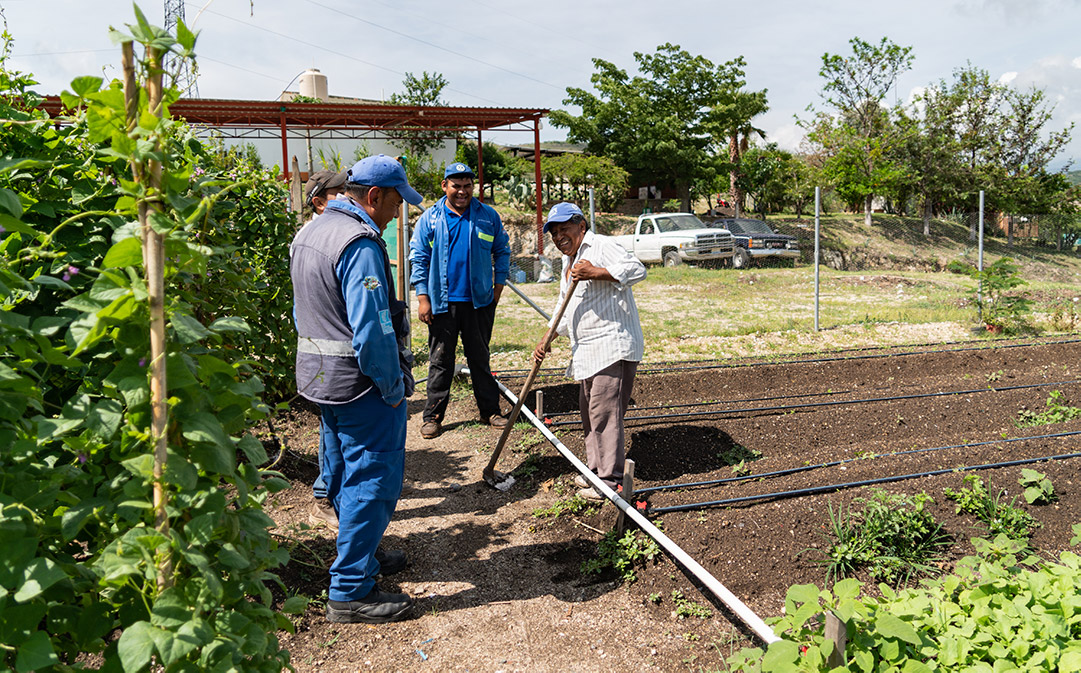

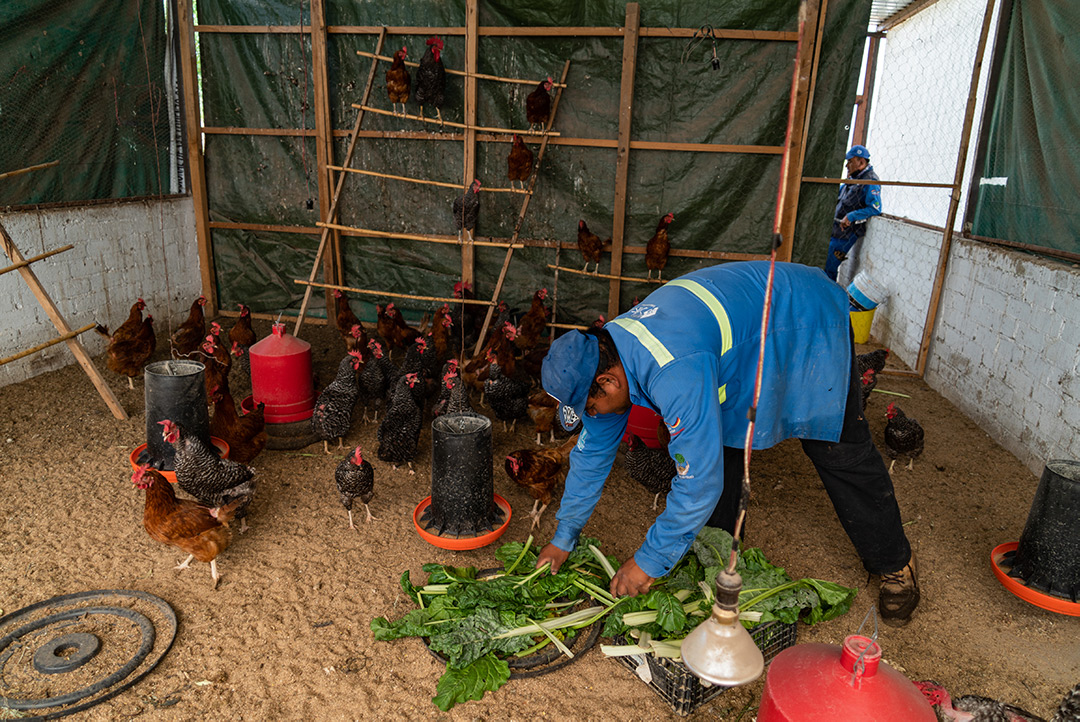
En este municipio se genera entre 3 y 3.5 toneladas de basura diariamente de una población de 8 mil personas y “se está recuperando entre un 5% y 7% de materiales reciclables, que para México es alto. Se tratan los residuos orgánicos, no un 100%, aproximadamente un 30%, porque la basura orgánica no se puede recuperar si viene contaminada o podrida. Ahí la importancia de separar desde los hogares”, complementa el integrante de Sikanda.
Pedro Cándido Díaz, encargado y trabajador del relleno, asegura que las condiciones laborales y que sea un proyecto comunitario “permite asumir el trato de la basura no solo como un compromiso con la comunidad, sino también con el planeta y la humanidad”.
Marisol Mendosa, trabajadora también del relleno comunitario, como mujer ha experimentado lo pesado que es trabajar con la basura, pero “me siento cómoda y me gusta”, y complementa que “la ciudadanía tiene que hacer conciencia para clasificar su basura. Ya que los materiales no se pueden reciclar si vienen contaminados con otras sustancias”.
De este proyecto ha derivado la producción de hortalizas, plantas medicinales, lombricomposta. En si mismo, no parece un tiradero de basura, ya que hay más vida que materia inerte. “Se puede hacer maravillas con la basura orgánica. Para reciclarla la recogemos directamente en las fruterías en el mercado y así las gallinas consumen comida limpia y así se producen huevos orgánicos”, dice Lorenzo Galván Juárez, trabajador del Relleno Sanitario, encargado de cuidar a las gallinas.
“Realmente podemos vivir de una mejor manera, pero tenemos que cambiar nuestra mentalidad de que todo es desechable. Tenemos que hacer conciencia que nuestro planeta no es desechable, porque no hay otro más”, concluye Lorenzo.
Derrame petrolero afecta vida de comunidades indígenas en Chiapas y Tabasco
Fuente: Avispa Midia
Por Sare Frabes
Pueblos zoques de Chiapas denunciaron que desde el pasado 26 de julio se presentó un derrame de petróleo, el cual está contaminando gravemente a los ríos Mezcalapa y Carrizal y afecta el suministro de agua para más de 600 mil personas de la región.
“La mancha de aceite crudo se dispersó por arroyos, ríos y pastizales principalmente en la ranchería El Platanar, municipio de Pichucalco, ubicada entre los límites de Chiapas y Tabasco, sobre la Cuenca Grijalva”, señalan organizaciones defensoras de la vida y del territorio zoque.
A su vez, identificaron como responsables de la contaminación a Petróleos Mexicanos (PEMEX) y la Agencia de Seguridad, Energía y Ambiente (ASEA), así como a la negligencia de los gobiernos de Chiapas y Tabasco por no realizar una revisión exhaustiva de los ductos de transportación de hidrocarburos.
Territorios de sacrificio
Mediante comunicado, el colectivo Defensoras de Nasakobajk, Concejo Zoque en Defensa de la vida y el territorio, así como el Centro de Lengua y Cultura Zoque y comunidades zoques residentes en Jalisco y Boston, reclamaron el hecho de que, pese a que desde hace meses se realizó el reporte de fuga en el municipio de Reforma, Chiapas, la petrolera mexicana no actuó para evitar el derrame.
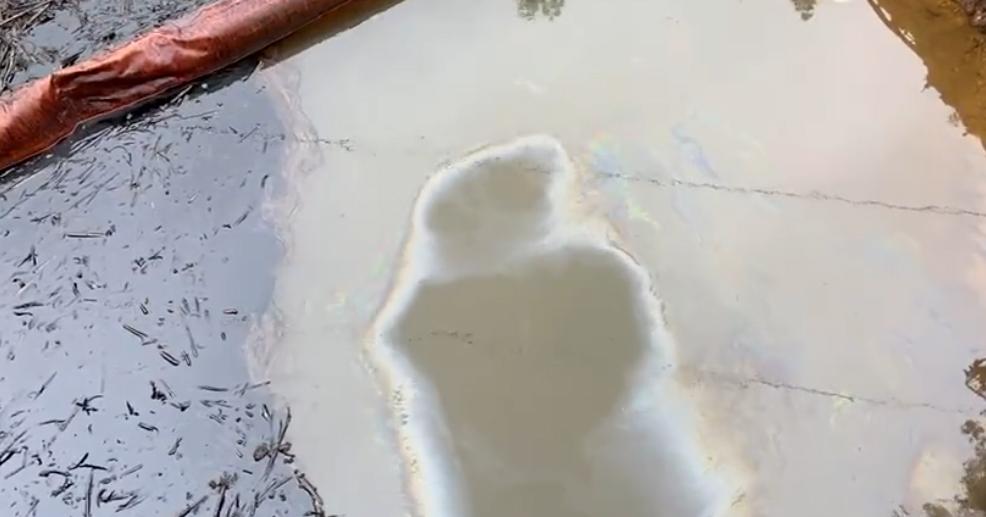

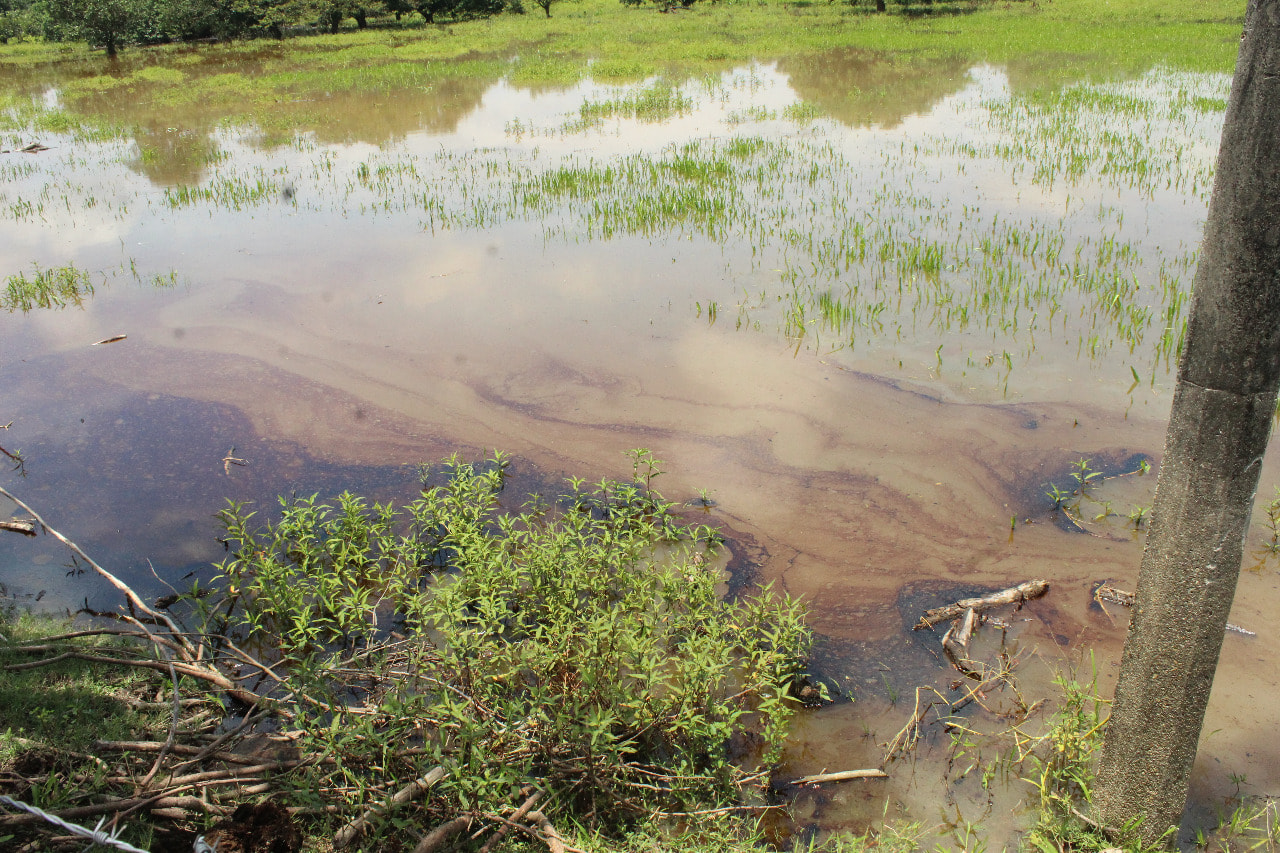
“Ésta negligencia es una evidencia de las formas de operación del Estado Mexicano, en particular desde su empresa Petróleos Mexicanos, quien desde hace 5 décadas ha convertido a nuestras tierras en verdaderos territorios de sacrificios como ocurre en el ejido Nuevo Volcán Chichonal, municipio de Juárez, pozo Catedral en Ostuacán y la laguna El Limón de Reforma, Chiapas, que son pasivos ambientales generados por el gobierno”, detallaron las organizaciones.
En el documento difundido este lunes (1), también exigen revisar los derechos de vía de los ductos, “pues muchas de ellas, se encuentran sobre viviendas, escuelas y torres de alta tensión de comunidades campesinas que además padecen los efectos de la lluvia ácida”.
Desastre
Según la versión de las autoridades municipales de Pichucalco, el desastre ambiental sucedió tras la perforación clandestina de los ductos que transportan los hidrocarburos, por lo que se decidió parar el bombeo de agua hacia los pueblos y comunidades de la zona, afectando con ello el suministro para 600 mil personas. En contraste, Octavio Romero Oropeza, director de PEMEX afirmó que aún están investigando las causas del derrame.
Por su parte, autoridades del municipio de Huimanguillo, Tabasco, informaron que pese a que desde el mismo 26 de julio se reportó el derrame, los especialistas de PEMEX arribaron al lugar un día después. A pesar de que, en un comunicado, el gobierno de Pichucalco informó que la fuga ya está controlada, los restos del hidrocarburo siguen filtrándose por la corriente del agua.
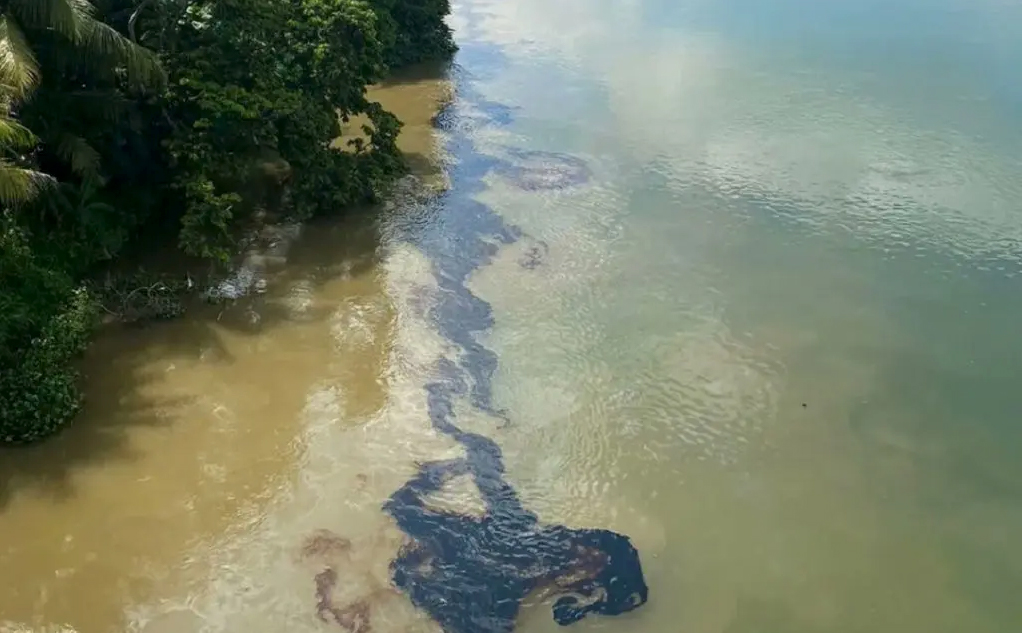
De acuerdo a un reporte de Pie de Página publicado este martes (2), aún se puede observar el líquido negro por varios kilómetros en las aguas de la subcuenca del río Mezcalapa, entre los municipios de Pichucalco, Chiapas y Huimanguillo, Tabasco.
Te puede interesar – En Chiapas, comunidades Zoques emiten alerta por incursión de mineras
Cabe destacar que según la ASEA, desde 2016 y hasta mayo del 2022 registró 5,777 accidentes en el sector de hidrocarburos. El reportaje Pemex: el infierno que la petrolera ha provocado afirma que, del total de estos incidentes, en 3,836 está involucrada PEMEX y sus filiales PEMEX Exploración y Producción (PEP), Perforación, Logística, Refinación y Transformación Industrial (TI). Además, testimonios de Veracruz, Hidalgo, Puebla y Tabasco demuestran graves afectaciones al medioambiente derivado de la extracción y distribución de hidrocarburos.
Para las organizaciones zoques, “ésta catástrofe es provocada por el sistema capitalista que, domina el mundo hoy en día. En este sistema, los dueños de las grandes corporaciones mundiales, en alianza con los gobiernos y todos sus aparatos de control y de represión, quieren obtener ganancias multimillonarias y acumular poder. Por eso, saquean nuestros territorios, destruyen la naturaleza, la vida del ecosistema y explotan nuestra fuerza de trabajo. Convocamos a los pueblos a fortalecer la organización comunitaria porque solamente como colectivos podremos defender a la madre tierra”.
